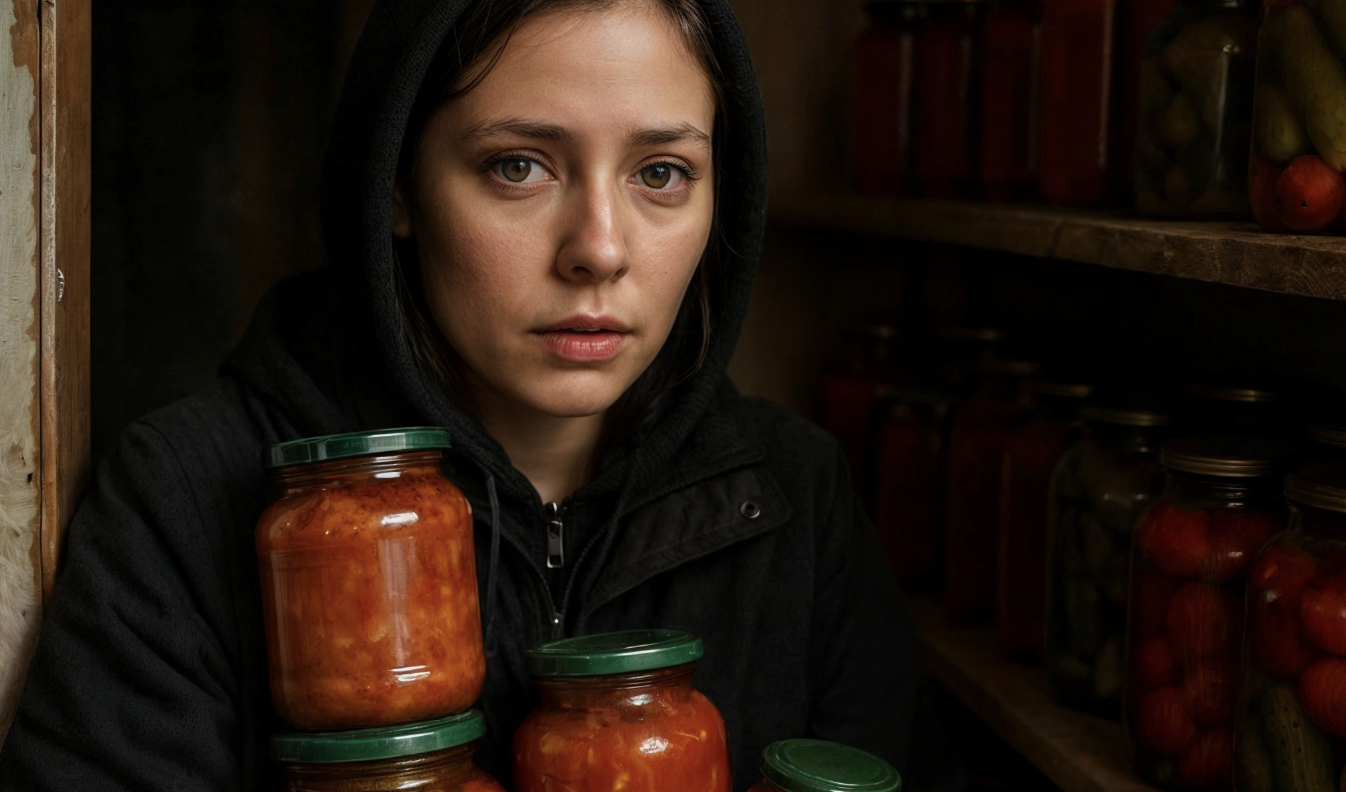— Well, hello there, hard workers! I’ve come for some treats!
The bright voice burst into the kitchen through the open window, making Nina flinch. The tongs slipped from her hands and splashed into the pot of boiling water. The scalding droplets burned her wrist, but the pain faded to the background—Svetlana herself was standing in the doorway.
The younger sister looked immaculate: a new burgundy fall jacket, flawless manicure, and that particular smile that appeared only during harvest season. In her hands she held a large woven basket—empty, of course.
Pyotr slowly set aside the towel he’d been using to wipe sweat from his forehead. The kitchen was stifling—he and his wife had been canning cucumbers for the last three hours, and the place had turned into a real preservation workshop. The air was saturated with the smells of garlic, dill, and hot peppers. Rows of jars filled with pickled cucumbers, tomatoes, and lecho crowded the table—the result of an entire day’s work, or if you counted from planting—an entire summer.
“Svetochka,” Nina exhaled, fishing the tongs out of the boiling water. “As always, perfect timing.”
The elder sister’s voice carried fatigue, laced with a faint bitterness. Pyotr nodded, greeting Svetlana. After years of marriage, he was used to his sister-in-law’s visits, but being used to them didn’t mean accepting them.
For fifteen years straight, the Ivanovs had lived at their dacha from May to October. Their six-hundred-square-meter plot turned every summer into a model homestead. Greenhouses full of tomatoes, beds of cucumbers, a potato patch, berry bushes—all of it demanded daily care and attention.
Nina got up at six to water the plants before the heat. Pyotr handled the heavy work—digging, building supports for the tomatoes, hauling buckets of water from the well. By evening they dropped into bed, exhausted, but fell asleep with a sense of a day well spent.
Their neighbors in the gardening cooperative respectfully called them “Stakhanovites of the vegetable beds.” Grandma Klava from the next plot often stopped by for advice—why Nina’s tomatoes were so big, what she used to feed her cucumbers. Nina generously shared both tips and seedlings.
Svetlana, Nina’s younger sister, had a dacha too—three plots down. She had renovated the little house inherited from her late mother-in-law, turning it into a cozy summer nest. Lawn, a gazebo with a swing, a barbecue area—everything was set up for comfortable leisure.
“Why would I need beds?” Svetlana would laugh, sipping a mojito in the apple tree’s shade. “In the twenty-first century you can buy everything in a store!”
True, she did plant a couple of tomato bushes—“for show,” as she put it. She watered them now and then, when she remembered. By August a few scrawny fruits hung on the vines, which Svetlana proudly photographed for social media with the caption “My harvest.”
But every fall, like clockwork, she appeared at her sister’s with an empty basket and sweet talk.
“Ninulya, you know how I love your pickles!” she would begin obliquely. “And your lecho—finger-licking good! Valera practically drools when he thinks about it.”
Nina couldn’t say no. The younger sister always knew how to find the right words. She’d complain about having no time—work, kids—then praise Nina’s cooking talent so lavishly that Nina would blush.
“I’d love, say, five jars of lecho, Ninulya,” the sister would continue. “And three of adjika—you know I adore spicy. And cucumbers, naturally. And tomatoes in their own juice…”
Every time, Pyotr would scowl as he watched his wife carry jar after jar up from the cellar.
“You’ll give away half the harvest again,” he would grumble later. “And we’ll spend the winter eating store-bought pickles.”
But Nina only sighed:
“What can you do, Petya. She’s my sister. Mama always taught us to share… I just can’t refuse her.”
“Sharing is when it goes both ways,” her husband muttered, but he didn’t press the argument.
Spring turned out unusually cold and drawn-out. The snow melted only at the end of April, and night frosts lasted until mid-May. The seedlings on the windowsills got leggy and weak; they had to throw out half of them.
All winter Nina’s back had ached—the aftermath of last year’s gardening heroics. Pyotr complained about his knees—age was catching up; both were past fifty. The doctor prescribed ointments and strongly recommended easing up on physical exertion.
“At your age you need to take care. Less strain, more rest.”
The couple exchanged glances. Rest—at the height of the dacha season?
Planting the seedlings was especially hard. After the cold spring, the soil was like stone; they had to turn it over twice. Nina set the tomatoes, pushing through the pain in her lower back. Pyotr hauled water, wincing at every step.
That evening, sitting on the veranda with a cup of tea, gazing at the spindly sprouts in the greenhouse, Nina gathered her courage and called her sister.
“Svetochka, I wanted to let you know… This year we’ll have very few preserves. We don’t have the strength we used to, and the spring set us back. Maybe you could plant something too? I’ll help, tell you how to do it right.”
A ringing laugh sounded in the receiver:
“Oh, Nin, come on! I’ve told you a hundred times—I can’t be digging in the dirt! My nails, my manicure… And why bother when there are stores? Don’t stress, I’ll manage somehow without your jars!”
Nina slowly hung up. Her sister’s words stung unexpectedly. “Manage without your jars”—so that’s how she saw their labor? As something optional, easy to forgo?
“What did sis say?” Pyotr asked, noticing Nina’s expression.
“She says she’ll manage. She’ll buy in the store.”
Pyotr snorted:
“Good. Let her buy. And we’ll keep the little we grow for ourselves.”
The summer was droughty. After the cold spring, nature seemed determined to catch up— the heat was unbearable. The couple watered the beds twice a day, but the plants still struggled. The harvest was meager—half the usual.
By late August there were only about three dozen jars in the cellar instead of the customary hundred. Every evening Nina counted them, figuring whether it would last till spring.
And then, on the first weekend of September, as Nina was wiping down the last jars of pickled cucumbers, she heard the familiar ring at the gate. Her heart skipped—she’d hoped her sister wouldn’t come this year.
But Svetlana arrived, as always, with an empty basket and a radiant smile. She wore a new coat the color of milky coffee and Italian heeled boots—completely unsuited to country roads.
“Well then, treat your hard workers!” She walked straight into the house without waiting to be invited and headed for the cellar. “Tomatoes, cucumbers—I’m already drooling! Valera even cleared out the fridge for them.”
“Svet, wait,” Nina hurried after her. “I warned you in the spring—we have very little this year.”
The smile slowly slid from Svetlana’s face. She scanned the kitchen and noticed the modest row of jars on the windowsill.
“That’s all?” she asked, incredulous.
“There’s a bit more in the pantry, but that’s our winter supply. I can give you a couple of jars, no more.”
The younger sister’s face twisted with indignation:
“A couple of jars? Have you completely lost it? Got stingy, did you? Greed eaten you up?”
Pyotr Ivanovich, who had been silent all this time, couldn’t take it:
“Svetlana, have you ever in your life held a hoe? Dug a single bed? Carried a bucket of water from the well? You think jars grow on trees?”
“Petya…” Nina tried to intervene, but her husband stopped her with a gesture.
“No, Nin, enough! How long can this go on? We break our backs all summer, and she shows up like it’s a grocery store!”
Svetlana flushed purple. She swung around to Nina:
“So that’s what you’re like! Stingy with your own sister! Mama was right when she said you’re selfish!”
She flung out her arm, hitting a jar of cucumbers on the table. The jar flew to the floor and shattered. Brine spread across the floorboards; cucumbers scattered among shards of glass underfoot.
“Choke on your preserves then!” Svetlana shouted and ran out, slamming the door so hard the windows rattled.
Nina stood in the middle of the kitchen, staring at the broken jar. Tears streamed down her cheeks—whether from hurt, anger, or exhaustion, she couldn’t tell. In every shard, in every crushed cucumber she saw her trampled kindness, care poured out to nowhere, and the shattering of her illusions about sisterly love.
Pyotr put his arm around her shoulders:
“Don’t cry, Nin. She’s not worth your tears.”
“I’m not crying because of her,” Nina sobbed. “I’m crying because of myself. For years I tried to earn her love with my jars. I thought if I kept giving her preserves, she’d be grateful, she’d value me. But she just used me.”
“We both let her,” Pyotr sighed. “But that’s enough. We don’t owe anyone anything. Let her learn to do it herself, or buy from the store like she threatened.”
Nina wiped her tears and nodded. For the first time in many years she felt she had a right to her work and its fruits. That kindness shouldn’t be boundless, and care shouldn’t be one-sided.
Together they cleaned up the shards and wiped the floor. They carefully carried the remaining jars down to the cellar.
“You know,” Nina said, “it’ll be enough for us. With extra, even. We’re counting just for the two of us now.”
The following spring the couple approached the dacha season differently. They planted exactly as much as they could tend without overexertion. They bought drip irrigation so they wouldn’t have to lug buckets. They even set aside one day a week to rest—just sitting in the gazebo, drinking tea, and admiring the flowers.
In mid-June Nina noticed unusual activity on Svetlana’s plot. Her sister, in work gloves and rubber boots, was digging in the soil. Seedling trays stood nearby.
“Look at that,” Pyotr said, surprised. “Could it be she decided to grow things herself?”
Turns out she had. After that autumn quarrel, Svetlana sulked for a long time, but then, apparently, her pride was pricked. She bought seeds, a shovel, even a gardening book. Valera twirled a finger at his temple but helped—hauled water, knocked together a small greenhouse.
From time to time Nina peeked over the fence at the neighboring plot. She saw her sister trying to plant tomatoes. She did it very clumsily—set the seedlings too deep, ignored spacing between bushes.
More than once Nina felt the urge to go over and advise her, but Pyotr stopped her:
“Don’t interfere. She said she’d manage.”
By August Svetlana’s plot showed uneven rows of tomatoes and cucumbers. The tomato plants weren’t tied up, the cucumbers sprawled along the ground, but they were growing. Svetlana came to the dacha every weekend—weeded, watered, cursed the Colorado beetles.
One evening Nina saw her sister picking her first tomatoes. Her face was red from the heat, wisps of hair stuck out from under her sun hat, but her eyes shone with pride.
In the fall, Nina was sitting on the porch sorting apples for compote when she saw Svetlana walking up the path. In her hands she carried a small basket with a few jars.
Svetlana stopped at the gate, clearly hesitating. Nina stood and came closer.
“Hi,” Svetlana said quietly.
“Hi,” Nina replied.
They stood on opposite sides of the fence, not knowing what to say. Svetlana spoke first:
“I, um… made lecho. For the first time in my life. It probably isn’t great, but it’s edible,” she said, holding out a jar to Nina. “Will you try it? Tell me what I did wrong?”
Nina took the jar and turned it in her hands. The lecho looked quite decent—red and green pieces of pepper in a tomato sauce.
“Thanks, Svet. We’ll definitely try it.”
“Nin… I’m sorry. For everything.”
“It’s behind us,” the older sister smiled. “If you want, I’ll show you how to tie up the tomatoes better next year?”
Svetlana nodded. They went into the house, and Nina put the kettle on. Outside, autumn shimmered gold; in the pantry rows of jars stood—not as many as before, but enough. And every jar now was in its proper place—earned, deserved, and truly appreciated.
And that single jar of lecho from Sveta stood in the most prominent spot—as a symbol that a person can change if they want to. And that even the most tangled relationships can be mended if there’s the will and the readiness to work—not only on the beds, but on oneself



